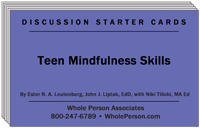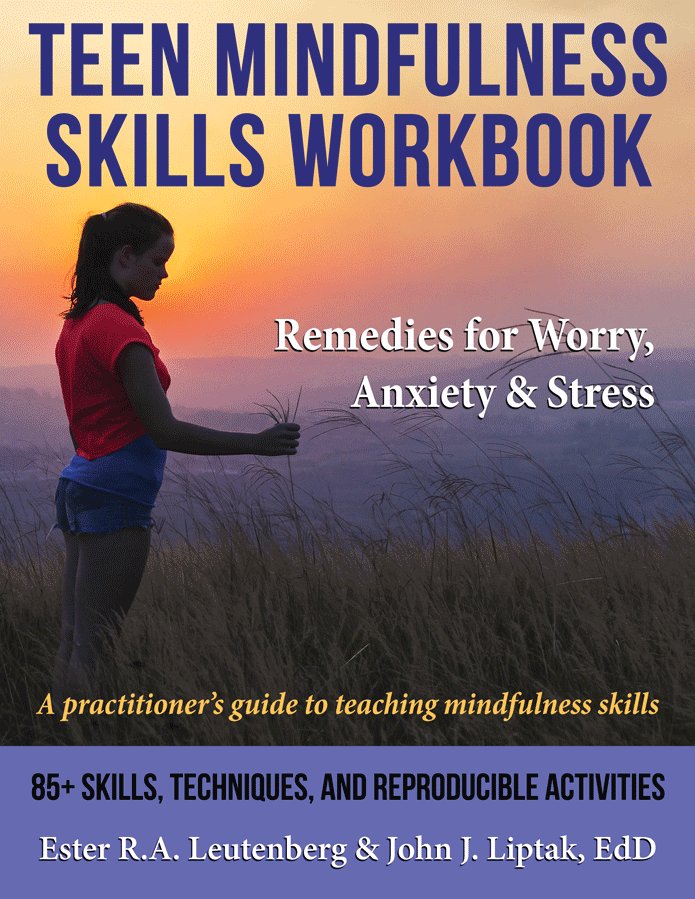Teen Mindfulness Skills
Do you have teenage clients struggling with worry, anxiety, and stress? Mindfulness is a proven antidote to address these emotionally centered issues. The Teen Mindfulness Skills Workbook: Remedies for Worry, Anxiety & Stress will give you the tools needed to help your teen clients as they explore and develop mindfulness skills.
This workbook is a practical tool for counselors, social workers, teachers, group leaders, therapists, and other helping professionals. Depending on the role of the professional using Teen Mindfulness Skills Workbook: Remedies for Worry, Anxiety & Stress, the modules can be used either individually or as part of an integrated mindfulness curriculum. You may use this program with clients who need to slow down, live more in the present moment, pay attention rather than live on autopilot, and accept life and others without judgment.
This workbook includes everything you need to help your teenage clients develop mindfulness skills. Each chapter begins with discussion questions to encourage deeper self-reflection, followed by activity pages designed to teach specific mindfulness skills.
Use the workbook's reproducible activities, exercises, and handouts with individual clients or groups. The techniques used in the assessment tool and self-exploration activities are evidence-based and field-tested.
Why Is Mindfulness Important?
Although mindfulness is not automatic and does not occur spontaneously, it can be learned and practiced to be intentionally accessed when needed. Some of the characteristics of mindfulness include non-judgmental awareness, paying attention on purpose, remaining non-judgmental, staying in the present, being non-reactive, and remaining open-hearted and compassionate.
Mindfulness has many benefits that can help to reduce the stress associated with daily hassles:
-
Increased acceptance—By not making evaluations, participants can accept the internal thoughts in their mind and see these messages as simple mental processes rather than pure truths.
-
Greater awareness—Participants will experience expanded awareness and a clearer vision of the world and its processes.
-
Less intense reactions—Participants will be less inclined to react when experiencing the stress of daily hassles. Instead, they will develop an observer stance through which they are free from evaluation, attachment, and frustration.
-
Relaxed approach—Participants will learn to relax to better cope with worry, anxiety, and stress related to daily hassles.
-
Calm demeanor—Participants develop a state of mind in which they are mentally and physically at peace. They will be prepared to deal more effectively with the daily worry, anxiety, and stress caused by everyday hassles. They will experience greater overall well-being.
-
Mental functioning—Participants will experience greater concentration, focus, and self-awareness to promote more significant personal development.
Chapter Descriptions:
The chapter and activity page titles all ask questions to think about and respond to. They will help your client lead a more mindful life.
Chapter 1: Are You on Autopilot?
This chapter will alert teens to wake-up calls or reminders, so they do not react immediately but come back to awareness to be more mindful during daily activities. It will explore those stressors that wake us up to the calm that can be part of our everyday lives. When daily hassles affect participants, mindfulness triggers remind them to break out of autopilot to be mindful, spontaneous, calm, and free.
Chapter 2: Do You Pay Full Attention?
This chapter will focus on teens developing awareness of their own bodies, thoughts, and sensations that arise in their experience. It will provide activities to help apply mindful awareness to all aspects of their bodily experience. Teens are instructed to mindfully notice what they see, hear, taste, feel, and smell. They are instructed how to cultivate an open, curious, and gentle attitude of mindfulness towards what they sense and feel about the hassles occurring in their lives.
Chapter 3: Can You Stay in the Present Moment?
This chapter will help teens choose to fully observe the events and feelings happening in their internal and external experiences right now. It will help participants let go of the need to continually focus on the past or the future and bring their full awareness to each moment in time.
Chapter 4: Do You Accept Others By Using Wise Judgment?
Mindfulness is not about solving problems and searching for solutions. Instead, it is more about observing your present-moment experiences with curiosity, openness, acceptance, and love. This chapter stresses that teens will refrain from making judgments about their daily hassle experiences in a state of true mindfulness, no matter how painful they may be. Teens will then practice describing their internal and external experiences with non-judgmental language.
Chapter 5: Do You Have a Backpack of Mindfulness Techniques?
This chapter will provide a variety of standard and unique mindfulness practices for any situation or time to overcome worry, anxiety, and stress.
*Free PDF Download: When you purchase your copy of Teen Mindfulness Skills Workbook: Remedies for Worry, Anxiety & Stress you’ll receive a free PDF download of the assessment tools and all of the reproducible activities in this workbook, making it easy for you to make copies.
Teen Mindfulness Skills Workbook eBook (PDF)
This workbook is also available as an eBook (PDF format). Save the eBook on your computer and print off the worksheets and handouts as you need them.
 Teen Mindfulness Skills Card Deck
Teen Mindfulness Skills Card Deck
Use the open-ended, discussion starter questions to jump start a group or individual session. Each question corresponds to a page in the workbook.
Sample Questions:
Mindfulness is a state in which you are aware in the present moment of what is occurring in your life. When are you usually mindful?
Describe a situation when your mind wanders. Ask others in the room.
Is it best to work on many things at one time (multi-task) or work on one thing at a time (uni-task)? Defend your opinion. Ask others for differing opinions.



